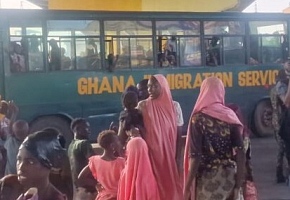In a sweeping and highly coordinated operation, the Ghana Immigration Service (GIS) launched a bold
city-wide crackdown in Accra on Friday, targeting undocumented migrants and street beggars in what is
being described as one of the largest public order exercises in recent years.
The operation, which covered hotspots such as Kaneshie, Abossey Okai, Lapaz, Adenta, and Madina
Junction, saw the arrest of over 2,000 individuals, many of them foreign nationals and minors engaged in
street begging activities. Officials say the move is part of a broader national effort to combat irregular
migration, human trafficking, and urban disorder.
“We are not just removing people off the streets,” said Superintendent Michael Amoako-Atta, Head of
Public Affairs for the GIS. “We are confronting a growing threat to national security, public health, and
child welfare — and we’re doing it humanely and lawfully.”
Behind the scenes, officials believe many of the children and their adult handlers are part of a growing
transnational trafficking network stretching from Niger and Chad into Ghana’s capital. GIS sources
revealed that initial profiling has confirmed suspicions that a significant number of the street children
were trafficked into the country and forced into begging as a form of economic exploitation.
“The problem isn’t new,” said Dr. Ernestina Tetteh, Convenor of the Coalition for Street-Connected
Children Organisation (CSCCO). “But the scale we’re seeing now is unprecedented. Children are being
smuggled across borders and used to fuel an underground economy on our streets.”
All individuals arrested are undergoing medical screening at the GIS Clinic, followed by biometric
profiling. Those without proper documentation will be repatriated, while those with criminal histories will
be handed over to law enforcement.
GIS has already begun liaising with embassies of neighboring countries to ensure the repatriation process
is carried out peacefully and respectfully. According to Amoako-Atta, embassies have so far responded
cooperatively, acknowledging the illegality of their citizens’ presence in Ghana.
Public opinion on the operation has been divided. Many Ghanaians have expressed relief at the removal
of large groups of street beggars, particularly in high-traffic commercial zones. Others, however, question
the timing and humanitarian impact, calling for social protection mechanisms to be prioritized alongside
enforcement.
The GIS has made it clear that this is not a one-off event. Similar operations are planned across other
regions, as part of a national strategy to ensure urban safety, curb illegal migration, and dismantle
trafficking syndicates.
As Accra begins to feel the impact of the operation, one thing is clear: the battle for control over Ghana’s
urban spaces and borders has entered a new and decisive phase. “We cannot let Accra become a hub for
human trafficking or unregulated street activity,” said Amoako-Atta. “Ghana must remain safe, lawful,
and dignified for all.”

